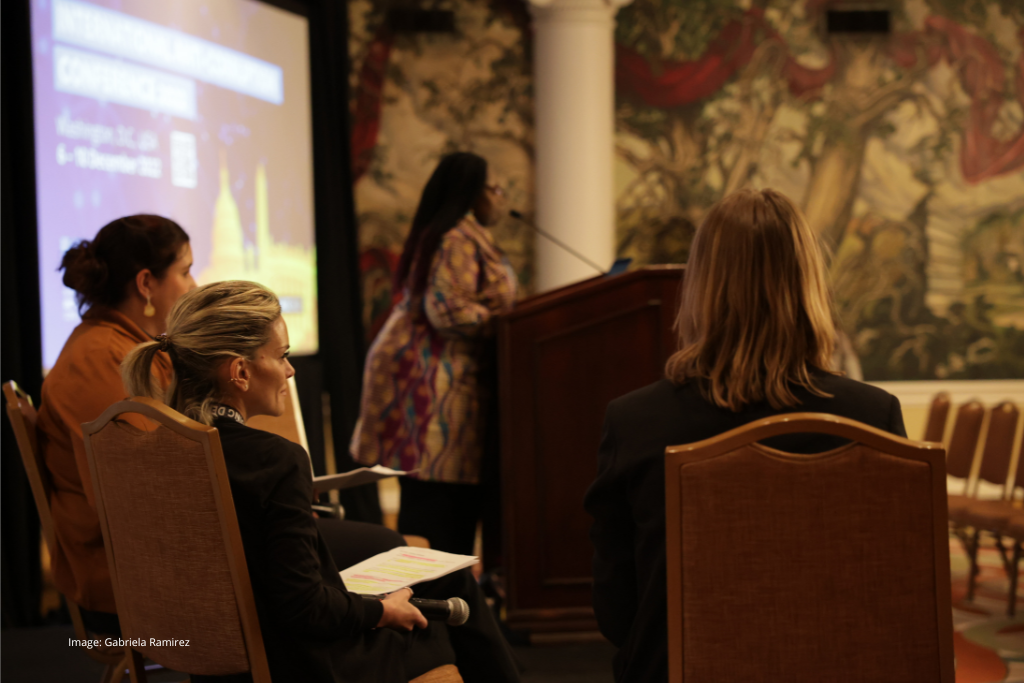In Nigeria, one young woman preparing to go to university was given a piece of advice: “Do not ever go into your male lecturer’s office alone.”
Warnings like this are not unusual for women embarking on new academic journeys. From Nigeria to Colombia to Bulgaria, the crime of sextortion — the abuse of power to obtain sexual benefits from those in a position of dependence — is part of the daily lives of women and girls.
Many of its victims experience sexual exploitation when accessing basic services such as health care, legal assistance, or education, and the effects can be devastating and long-term.
Although boys, men, LGBTQ+ people, and other minority communities are also affected, research shows that sextortion ia “gendered form of corruption” that most adversely affects women.
“When women get sextorted, they are more likely to stop their education than men,” said Dr. Ortrun Merkle, a researcher from United Nations University, during a discussion focusing on why a feminist approach is needed to fighting corruption at the International Anti-Corruption Conference (IACC) in Washington DC last December.
Sexual exploitation preys on women and children made vulnerable by poverty and economic circumstances and over time, this engenders corruption and gender inequality. Whether in schools, universities, hospitals, or the experiences of crossing a border as a migrant or looking for a job, the female body becomes the currency required to access basic services.
“Usually migrant women travel with less resources than men, which puts them in a more vulnerable position,” Merkle said. Once the cycle of abuse begins, it can be difficult to end. Ultimately, the consequences of sextortion play a key role in the further underdevelopment of women’s health, education, relationships, and well-being.
A 2020 report by Transparency International found in Latin America and the Middle East and North Africa region, one in five people experienced or knows someone who experienced sexual extortion when accessing government services such as health care or education. In a 2019 survey conducted in Zimbabwe, cited in the same report, 57% of the women surveyed reported that they had needed to offer sexual benefits in exchange for jobs, medical care, and even when seeking placements at schools for their children.
As governments and civil societies around the world develop strategies to fight against all forms of corruption, there is a clear need for a political commitment to gender equality.
“We look at corruption as a very male issue. However, power is all about gender structures and who has power and who has not… it is about understanding how structural issues prevent women and men from having equal opportunities,” explains Merkle.
Germany, Sweden and Norway are some of the nations working to define gender equality as a central feature of their foreign policy.
“A feminist development policy is about equal opportunities and justice, and everyone benefits from it,” said Dr. Jürgen Karl Zattler, director general for international development policy at the German Federal Ministry for Economic Cooperation and Development (BMZ).
One topic touched on during the discussion was how gender issues are seen as women’s issues rather than society issues, but ultimately, men are needed as allies and their involvement is key to achieving an equal world and gender parity.
According to UN Women, at the current rate, it will take 130 years to achieve gender equality at the highest positions of power, with women making up just 25% of parliamentarians globally, and 13% of negotiators, 6% of mediators and 6% of signatories in formal peace processes.
Only two sessions in December’s IACC conference focused on the topic of gender and corruption. “Are we happy about this?” asked Linda Ofori-Kwafo, executive director at the Ghana Integrity Initiative, of the mainly female audience at the panel. “Who are we including, and who is excluded from these sessions? Those are the questions we need to ask ourselves.”


